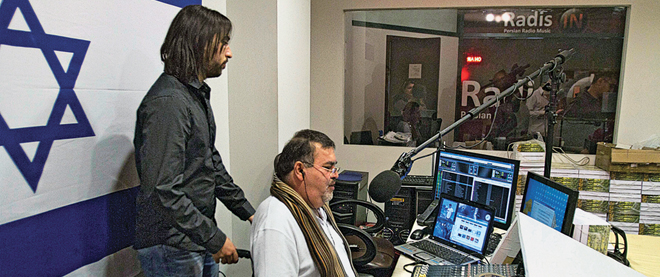From Israel to Iran, with love
A radio station based in Tel Aviv is broadcasting news and music to the Islamic Republic. In return, its workers get threats.
Dan Balilty/AP
Share

They’ve received threatening phone calls directly from authorities in Iran, berating them for the work they do. And in the wake of bombings targeting Israelis in India and Thailand, they’ve been warned to “lower their profile.” But in a general meeting last week, the employees of Tel Aviv-based Radio RadisIN pledged to continue broadcasting their Farsi-language music, spoken word and news programming into Iran—despite threats of danger from agents of Tehran. “All we do is transmit a message of love and brotherhood,” says Parviz Barkhordar, the host of a weekly political and social issues program called Connection. “We believe we are doing the right thing.”
Radio RadisIN went on the air on March 24, 2009. Since then, it has started streaming its programming to Farsi-speaking audiences all over the world. Barkhordar says RadisIN has more than 200,000 listeners in places as far-reaching as Los Angeles and Malaysia.
But the radio station’s main purpose is to broadcast to the people of Iran and counter the escalating tension between that country and Israel—not to mention a wide swath of the international community—with messages of peace. “We love our brothers and sisters in Iran,” says Barkhordar, who is originally from Iran but emigrated to the U.S. before the Islamic Revolution of 1979 and moved to Israel in 1995. RadisIN takes anonymous calls from people living in Iran to discuss issues in the country and create a “bridge to unite all Persians, no matter where they live,” says Barkhordar. The station also regularly attempts to call authorities in Iran while on the air. In response, they receive nothing but “bad words and hatred,” says Barkhordar.
RadisIN is hardly the first radio station to transmit programs into an authoritarian state with tight media control. The practice harkens back to the early days of the Cold War, when Radio Free Europe was created by the U.S. in 1949 to broadcast anti-Communist propaganda over the Iron Curtain from Munich. Four years later, Radio Liberty was created for audiences in the Soviet Union. Over the years, the radio stations began providing relatively free and unbiased media coverage of events within the Warsaw Pact countries and the U.S.S.R., notably during the Polish Solidarity movement and the fall of the Berlin Wall.
RFE/RL still broadcasts news and analysis to Russia and countries like Ukraine, Belarus, Iran and Iraq, as well as regions like the Balkans and Central Asia, and is funded by the U.S. Congress. Its Afghan incarnation, Radio Azadi, bills itself as the “leading media outlet in Afghanistan,” reaching 50 per cent of the population.
In Seoul, North Korean defectors have established their own clandestine radio station called Free North Korea Radio, which aims to bring news of the outside world to the people in North Korea. Voice of Tibet, which has a broadcast station in northern India, beams similar programming across the Himalayas to the people of Tibet.
For RadisIN, it’s important to keep working to connect with Iranians and spread goodwill as the prospect of war between Israel and Iran persists. “We won’t stop saying what we have to say,” he says. “It’s just a message of love.”